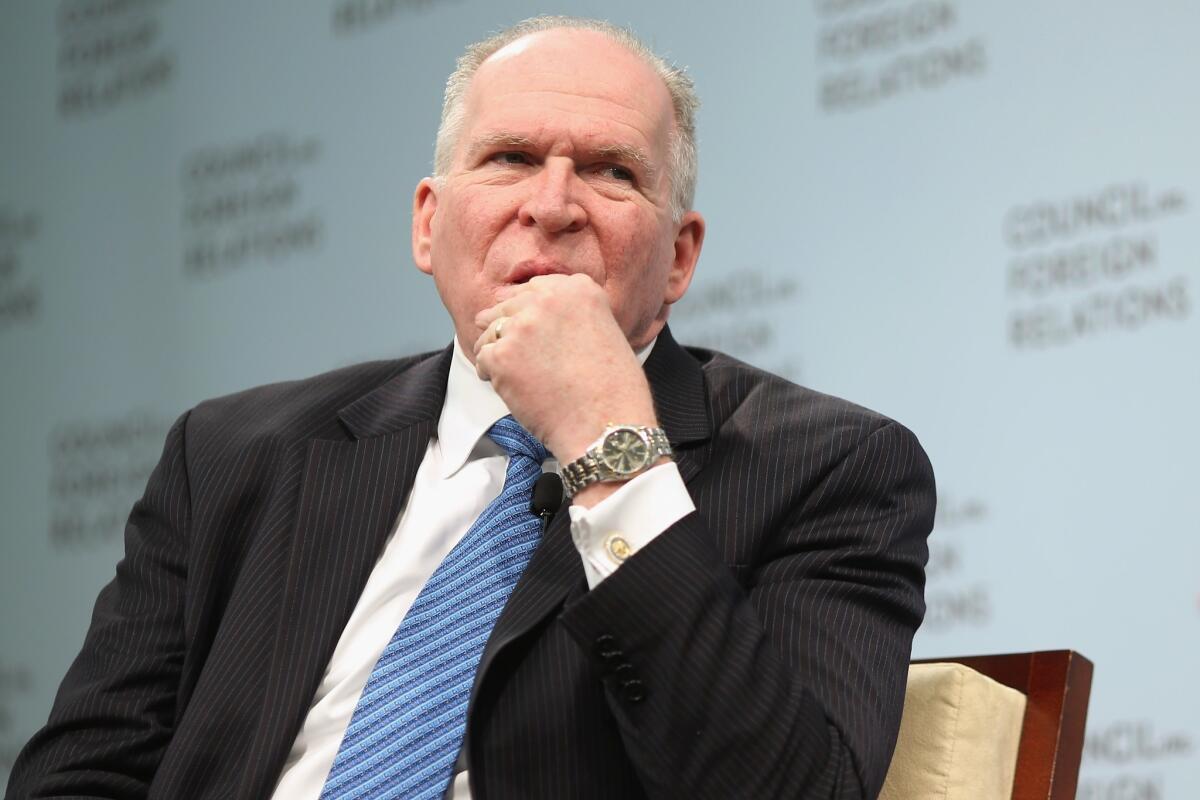CIA director, on defensive, admits flaws in interrogation program

Reporting from Langley, Va. — In an unprecedented news conference from CIA headquarters, agency Director John Brennan admitted that some officers had engaged in “abhorrent” conduct in their interrogations of terrorism suspects, but he insisted that the secret program had provided “useful intelligence.”
Whether that intelligence could have been obtained without torture was “unknowable,” he said.
No CIA director has ever given a televised address at agency headquarters. Brennan did so partially to rebut a Senate Intelligence Committee report on the CIA’s George W. Bush-era interrogation program. He called the report “flawed.”
Even as he spoke, the report’s principal architect, Senate Intelligence Committee Chairwoman Dianne Feinstein (D-Calif.), shot back critiques on her Twitter account.
The exchanges between the CIA director and the head of the Senate panel that oversees the agency highlighted the public debate that began Tuesday when the committee’s Democratic majority released a scathing report on the CIA’s use of torture after the Sept. 11, 2001, attacks.
Feinstein and her colleagues among the Democratic majority on the committee, along with some Republicans, including Sen. John McCain (R-Ariz.), have denounced the agency’s actions as torture. The report’s extensive documentation aims to prove that the tactics produced no actionable intelligence that could not have been obtained without mistreatment of prisoners.
By contrast, former Vice President Dick Cheney and top CIA officials from the Bush administration, which allowed what the CIA called its “enhanced interrogation techniques,” have insisted that the tactics saved thousands of lives. Cheney has denounced the report as “full of crap.”
Brennan sought to strike a middle position, reflecting the stance of President Obama, who banned the use of coercive interrogation tactics but has also praised the CIA as protecting the country.
Standing in the white marble entrance of the agency’s headquarters in front of about 20 senior CIA managers, Brennan said that the agency had not always held its officers accountable and had made errors during the Bush years.
But he added he was frustrated that the study had portrayed CIA officers as “untrustworthy.” The Senate report lists instances where the CIA’s statements to members of Congress about the interrogation program were false.
“This in no way comports with my experience in the CIA,” said Brennan, who first joined the agency in 1980.
“We take exceptional pride in providing ‘truth to power,’ whether that power likes or agrees with what we believe and say or not,” he said. “CIA’s legitimacy is closely tied to its credibility, and we can afford to lose neither.”
Brennan insisted that the interrogation program had produced intelligence that thwarted attack plans and helped lead to the raid in which Osama bin Laden was killed — both points that the committee report disputed.
Detainees who had been subjected to waterboarding, hung from bars, beaten or otherwise brutalized had divulged secrets, he said.
But “we have not concluded that it was the use of EITs within that program that allowed us to obtain useful information,” he said, using an abbreviation for enhanced interrogation techniques.
Staff in Feinstein’s office shot back immediately. “Study shows it IS knowable: CIA had info before torture. #ReadTheReport,” read one message.
“Study definitively proves EITs did not lead to bin Laden. Page 378. #ReadTheReport,” read another.
Feinstein and Brennan have clashed for more than a year over the report, trading accusations that each other’s staff have hacked computers and stolen documents.
The CIA spent $40 million to lease an office in Virginia and pay contractors to screen more than 6.3 million pages of material before giving the committee access to them.
Brennan declined to say directly whether he had opposed release of the report but made his overall feeling clear. “I think there’s more than enough transparency that’s happened over the last couple days. It’s over the top,” he said.
Some Democratic lawmakers have called for Brennan to step down because he was a senior manager at the agency in 2002 and 2003, when some detainees were tortured, and because of what they see as his efforts to impede the Senate committee’s work.
Obama, however, has stood by Brennan, who was the top counter-terrorism aide at the White House before he moved to head the CIA early in 2013.
Before Brennan’s news conference, Obama asked him to personally take part in Thursday’s presidential daily intelligence briefing and later expressed through the White House spokesman his “full confidence” in the CIA director.
Brennan is “a patriot,” White House Press Secretary Josh Earnest said, adding that Obama has counted on him for years and continues to rely on his advice.
President George W. Bush authorized the CIA to capture and detain suspected terrorists six days after the 2001 attacks in which four jetliners were turned into missiles, killing nearly 3,000 people on U.S. soil.
The program was “uncharted territory” for the CIA, Brennan said, and began at a time when the agency was receiving “numerous, credible and very worrisome reports about a second and third wave of major attacks.”
“We were not prepared,” Brennan said, adding that the CIA at the time had little experience housing detainees and few trained interrogators.
The majority of officers involved “did what they were asked to do in the service of our nation,” including raise objections, Brennan said.
The CIA stopped using brutal techniques in December 2007, Brennan noted, adding that he “fully supports” Obama’s ban on the use of waterboarding and other types of torture.
“I believe effective, noncoercive methods are available to elicit such information — methods that do not have a counterproductive impact on our national security and our national standing,” Brennan said.
In a statement following Brennan’s remarks, Feinstein said his words represented a “welcome change” from the agency’s past position that information was obtained as a direct result of the brutal treatment.
“I am pleased that Director Brennan is attempting to acknowledge past mistakes by the agency in order to focus on current and future missions and make sure that a program like this is never considered again,” Feinstein said.
Follow @ByBrianBennett on Twitter
More to Read
Sign up for Essential California
The most important California stories and recommendations in your inbox every morning.
You may occasionally receive promotional content from the Los Angeles Times.











